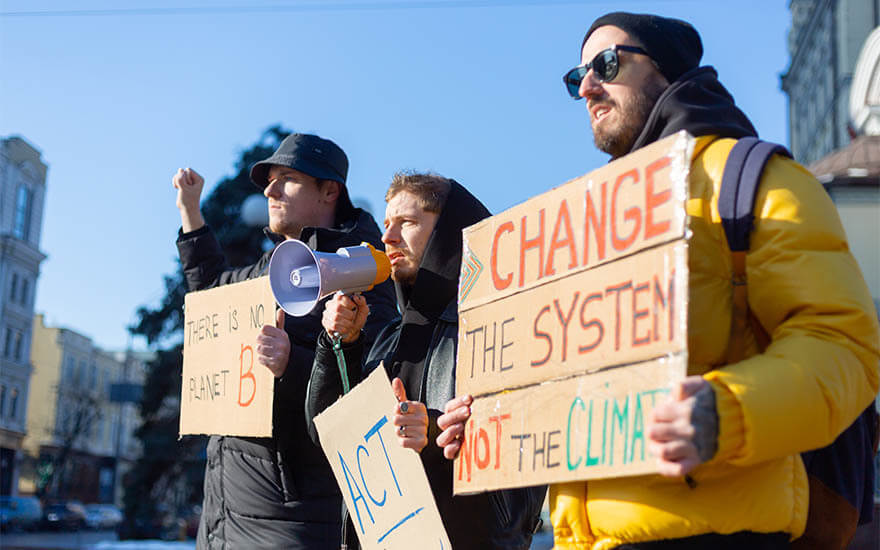According to a new global consumer survey, two in three people are willing to reduce their consumption by half to avoid environmental damage and climate change, especially those who have worried children at home.
The research shows that global concern about climate change is at an all-time high and that most people living with children under 18 say their children are very worried about environmental problems and climate change.
People living in these households are more likely than the average to have a strong desire to live sustainably and are much more likely to have made significant changes to do so.

The soaring cost of living
The cost-of-living crisis also affects consumers’ willingness to pay for more purposeful products and brands. Amid widespread increases in daily expenses, consumers have become less likely to say they are willing to pay more for products or brands that contribute positively to society or the environment, especially in Europe.
As many as three in four people worldwide agree that environmentally responsible products have become more expensive in the past year.
The findings from the 2022 Healthy & Sustainable Living research study by global insights and advisory consultancy GlobeScan and partners surveyed almost 30,000 people across 31 markets. This study has been tracking consumer attitudes and behaviors around living healthier and more sustainable lifestyles since 2019.

Purchase Power
The research also shows consumers’ widespread desire to change their behaviors to be healthier and more sustainable. Still, the gap between desire and action remains persistent. Consumers with low purchasing power, those who are younger, and consumers in emerging markets experience the most significant gaps between aspirations and action.
Despite recent discussions about greenwashing, the study reveals that consumers remain interested in sustainability marketing communications. Most of those who have heard or read about a company’s sustainability messaging say they trust these communications.
Key findings include:
- Concern about climate change and environmental issues continues to grow as 65% of people now say climate change is “very serious,” up from 48% in 2003 among 17 tracked markets.
- 65% of people living with children under 18 say their children are very worried about environmental problems and climate change.
- 40% of people worldwide say they would not want to have children because of climate change.
- 68% somewhat agree that they would be willing to reduce their consumption by half to avoid environmental damage and climate change, especially those with worried children at home (85%).
- Those living with children under the age of 18 who say their children are very worried about environmental problems and climate change are more likely than average to have a strong desire to live sustainably (66%) and are much more likely to have made significant changes recently to do so (42%).
- Although half (50%) say, they would like to change their lifestyle “a great deal” to be more environmentally friendly, only 26% claim to have made “major changes” in the past year to reduce their impact.
- 75% of consumers agree that environmentally responsible products have become more expensive in the past 12 months.
- 55% of consumers across 23 markets tracked between 2019 and 2022 now say they at least “somewhat agree” they would be willing to pay more for products or brands that work to improve society and the environment, down from 58% in 2021 and 2020. Willingness to pay more has declined the most in Australia, Canada, Germany, Indonesia, Italy, Nigeria, Peru, Portugal, Spain, Sweden, and the UK.
- Consumers trust sustainability marketing communications. Eight in ten people who have heard or read about a company’s sustainability messaging trust the communications.
Chris Coulter, CEO, GlobeScan said: “Despite the cost-of-living crisis, the pandemic and the war in Ukraine, we are seeing remarkably robust levels of concern and engagement everywhere on the sustainability agenda.”
GlobeScan designed the 2022 study with various partners, including Akatu Institute, IKEA, Levi Strauss & Co., M&C Saatchi Group, NYU Stern Center for Sustainable Business, P&G, PepsiCo, Reckitt, Visa, and WWF International.
The study aims to help organizations better understand consumers’ mindsets globally and what enables them or prevents them from living more healthily and sustainably.
Samantha Putt Del Pino, Interim Global Markets Practice Leader for WWF remarked: “This year, the survey ratifies the increasing importance and concern on climate change and environmental issues for consumers, especially those with younger children.
Governments will soon be coming together at COP27 and COP15 to negotiate agreements on climate and nature. They should not disappoint present and future generations but assure ambitious frameworks that deliver a net-zero, nature-positive, and equitable future.”
Related Articles
Overcoming the Scarcity Mindset
“If You Can’t Complete a Spartan Race, You Don’t Deserve to be on this Planet”






